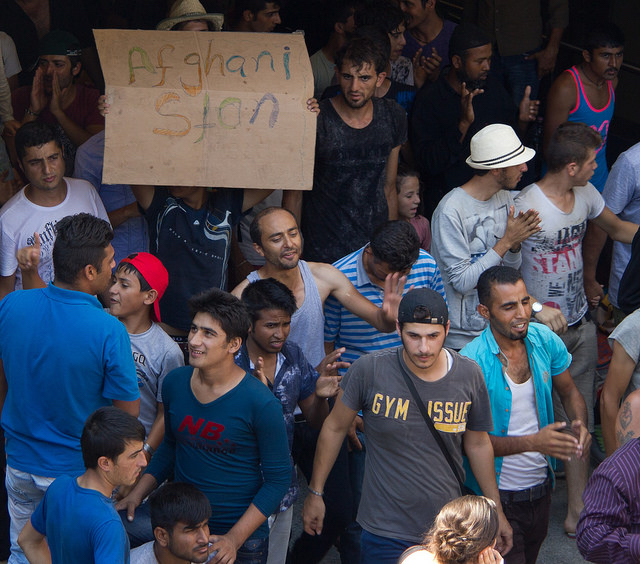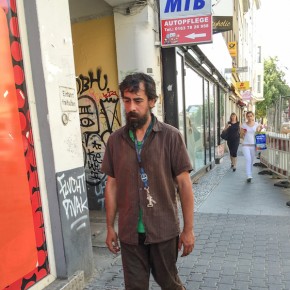It was raining on Saturday in Budapest. The end of summer is a constant source of anxiety for refugees and their supporters, and so it seems serendipitous that, just in time for the rain, the improvised refugee camp in front of Keleti train station in Budapest has been resolved. The trains to Austria are running again, and the Hungarian government had sent buses to transport hundreds of refugees to the border.
The desperate move of simply beginning to march to the border seems to have worked. After a brief moment of tension, the German and Austrian governments agreed to open their borders and gave the Hungarian government the OK to let the refugees proceed. Several thousand were expected to arrive in Bavaria on Saturday alone.
Of course, this is not the end of anything. Thousands more are now moving through Hungary via bus, via train, often on foot. Thousands more who are at the moment interned in camps may seek the opportunity to cross the border before it may once again be sealed. And of course, nobody knows how many are still on the trail, following those who have finally today managed to arrive.
Not only for the refugees themselves is it a very uncertain situation. Nobody knows what will happen next, and hopes and certainties may be crushed. The reason for this confusion lies on the political level: All the actors are very aware that they are not only trying to solve the situation of a couple of thousand people stranded in Hungary. Instead, they are trying to, in real-time, replace the finally collapsing Dublin-order with a new set of ad-hoc-solutions.
On September 14, there will be an extraordinary meeting of the Justice and Home Affairs Council of the European Union, where the next steps, especially concerning “return policy” and “international cooperation”, will be discussed. Like always, the EU has waited until the last moment, until a moment of crisis such as this, to reform the way it will manage and coordinates the asylum crisis. But the moment is finally here. Until then, we will see much more open and behind-the-scenes political manouvering of the kind that has made the current crisis so difficult to resolve.
The refugees were not the only ones staging a standoff in recent days: European governments, primarily Germany and Hungary, were, as well. Underlying the halting response to the demands of Keleti was not necessarily coldness to the fates of the refugees, but also the already well-known dysfunctionality of the European political process. In order to understand the nature of this crisis, it is necessary to step back a little, and try to understand how byzantine European asylum regulations have helped create it.

The crisis began with the deteriorating conditions in the Hungarian refugee system over the last year. It grew and grew over months, and finally this week, it reached a critical mass. At the same time, the inadequacy of Dublin regulations had become more and more apparent in, weeks – not least by the gruesome death of 71 refugees who suffocated to death in a smuggler’s truck on an Austrian highway. These were not people trying to enter ‘Fortress Europe’. They were trying to move inside of it. It was only a matter of time before the regulations, which drove so many into dangerous pacts with smugglers, would be openly challenged.
It is important to remember, though, that the Dublin Regulation, which aimed to ensure that refugees would always have to apply for asylum in the very first EU-country they entered, always had holes in it, exceptions, and legal (and illegal) ways to circumvent them. It was not only the refugees themselves who did this, who tried to avoid being registered in southern Europe, doing everything, including entrusting their lives to smugglers, to find a better life in the north.
To return somebody to the country where they were first registered and fingerprinted is a complicated bureaucratic procedure, which can be challenged in the courts on many grounds. It also requires, obviously, the cooperation of the receiving-country, say Greece, Italy, or Hungary – countries which are facing very difficult situations, which are, in the case of Hungary, made even more difficult by the irresponsible actions of an extraordinarily right-wing government.
In June, Hungary first openly refused accepting refugees, which under Dublin Regulation, it was required to take back, citing “technical reasons.” It was part political provocation, part expression of the reality that Hungary felt “overburdened.” It was a first crack in the Dublin system, to which many have recently been added.
But there are many different reasons for a suspension of the Dublin regulation. If, for example, it is not guaranteed that the refugees will get a fair asylum process in the receiving country, or that they will be treated and housed in a humane manner, it is legally impossible to expel them.
This is the reason, for example, why Germany cannot return any refugees to Greece, which is unable to manage the exploding inflow of refugees over the Mediterranean. It is also the reason why many refugees, and not only Syrians, can feel secure that they will not be returned to Hungary once they reach Germany – even though they may have first been registered in Hungary, and under the Dublin rules, would have to claim asylum there.

Just Google “Ungarn”, “Flüchtling”, and “Verwaltungsgericht,” and you will see why. You will find many different cases of German district courts forbidding the German authorities to return a refugee to Hungary. Take this case from Cologne, from the end of July: An Iraqi man who had lost an eye and part of his leg in the war claimed that he was jailed by the Hungarian authorities, and did not receive medical treatment. The report goes on to say: “The detention facilities do not fulfill hygienic minimum standards. There is no medical care. If a detained asylum seeker must visit a doctor or an Hungarian office, he will be brought there ‘leashed’ in a humiliatingly manner, explained the judges.”
“Leashed”! Remember that when you hear somebody ask next time: Why don’t they just stay in Hungary. Aren’t they safe there?
There have been many of these cases in the last months. In early July, a court in Münster found that the Hungarian government is “neither willing nor able” to take care of the refugees inside its border in an acceptable manner – and allowed a young Syrian to stay. And just a month ago, a court in Cologne declared that the Hungarian government “indiscriminately” jails refugees which are returned under the Dublin-provisions for up to six months – under horrendous conditions.
Instead of trying to resolve this crisis inside its borders, however, the Hungarian government pours more and more money into deterrence, building a massive wall on the border, and now, it seems, mobilizing the army. The Hungarian parliament just passed a law, which did exactly nothing to alleviate the dismal conditions in the Hungarian asylum system, but instead criminalizes the refugees and their supporters further. Smugglers can now be charged with up to 20 years in jail, and even just crossing the border illegally has become a crime. A crime, it needs to be said, which will almost definitely be used as grounds to refuse asylum and expel the refugee.
This is the background to Germany’s recent decision to at least suspend the Dublin-provisions for Syrians, which could be said to have provoked the current situation. But, it needs to be remembered, the German government did not loudly welcome Syrian refugees (even though it may have as well). Instead, the Federal Office for Migration and Refugees issued an internal guideline to its employees to no longer try to return Syrians to other Dublin states, which was then, four days later, leaked to the press, on August 25th. Already before this, many Syrians who had entered the EU through another state were allowed to stay on in Germany for a different set of legal and humanitarian reasons.
The German authorities were not simply overcome by warm feelings for Syrians one day, and decided to throw them a bone. Instead, they are tasked with upholding a complex set of regulations which are becoming more and more incompatible with the realities – and which are, it could be argued, actively being sabotaged by the Hungarian government.
This was simply a way to take some pressure out of the system while at the same time keeping it in place. This also explains why the German government, at the same time as it suspended Dublin for Syrians already in Germany, insisted that Dublin-III still be enforced by the peripheral states, something which has often been called hypocritical in the international media.
Photographs courtesy of Eadaoinflynn. Published under a Creative Commons license.





